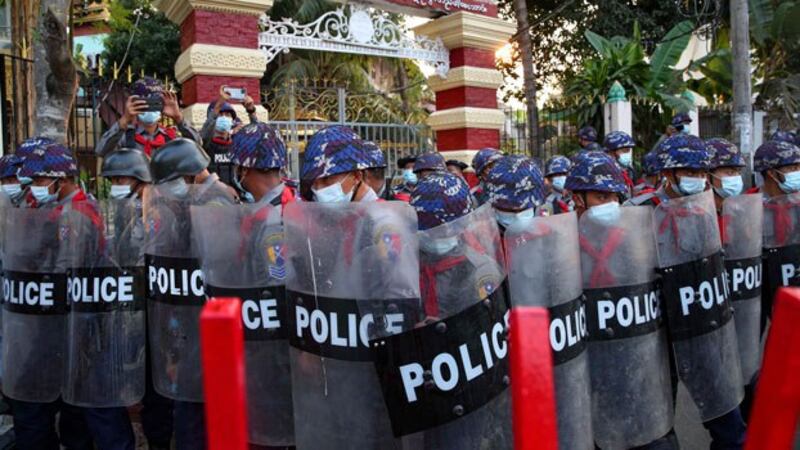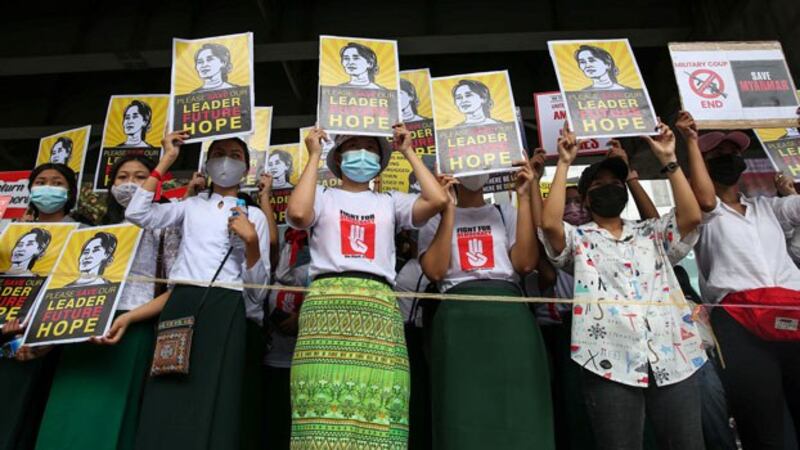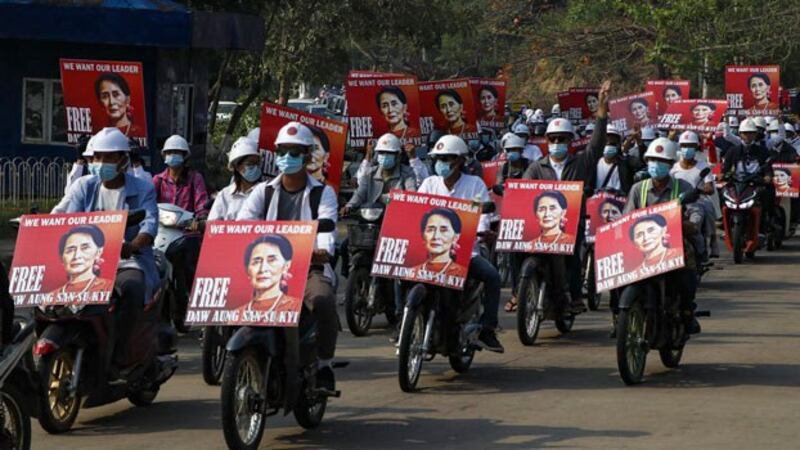With Myanmar’s mass anti-coup demonstrations showing no sign of letting up and even drawing more civil servants, the military junta that seized power this month stepped up arrests of protesters on Thursday and attacked journalists covering the rallies.
Authorities have arrested, charged, or sentenced 521 people since the coup deposed Aung San Suu Kyi and her elected government on Feb. 1, with 44 of them now released, according to the Assistance Association for Political Prisoners (AAPP Burma). The figure includes top leaders detained in the coup as well as protesters.
Security forces are beating reporters with police batons at protest sites while cracking down on demonstrators, with plainclothes officers photographing and tailing reporters covering the rallies, witnesses said.
Video journalist Kyaw Zey Win, who was covering a protest in Mandalay, said he was beaten by police and detained even though he identified himself as a member of the media.
“One of them who dragged me from the scene began beating me, and I fell as another one kicked me,” he told RFA. “Then, they repeatedly beat my head with batons. They stepped on my face. I covered my face with my hands.”
After police and soldiers put Kyaw Zey Win in one of their vehicles and asked again where he was from, he repeated that he was a journalist, and then was let go, he said.
“The entire time, the police and soldiers asked me if I was really a journalist and whether I was going to tarnish their image with my photos,” he said. “They swore at me the whole time.”
A freelance journalist from Pathein who declined to give his name for safety reasons said security forces were tailing reporters covering the demonstrations.
“I noticed some police in plain clothes who followed me home,” he said. “I also noticed some people on motorbikes circling my house and watching to see if I went out.”

‘They should keep their distance’
Journalist Myint Kyaw warned all reporters covering the protests to maintain a distance from security forces.
“They are giving the reporters payback,” he said. “The authorities dislike the way the media portray them. … Journalists should keep their distance from the action so they can avoid any violence.”
Zaw Htut Lwin, a Mawlamyine-based journalist with the Democratic Voice of Burma, said there are no guarantees for the safety of reporters covering the protests.
He noted that Myanmar’s News Media Law allows journalists to cover protests in line with regulations and forbids security forces from detaining them or confiscating and destroying their recordings.
“If the military’s State Administration Council wants to act in line with the law, then it needs to comply with these mandates,” he said. “Only then can there be a guarantee for the security of journalists. If they don’t comply, then it will not be safe for us.”
Major General Zaw Min Tun, deputy minister of information, told reporters at a press conference on Tuesday that journalists’ work should comply with the law.
“We may limit actions that violate the laws, but we cannot give any guarantee that we will not prosecute journalists,” he said.
On Feb.14, police arrested five reporters who were covering an incident where security forces fired their guns during a standoff with protests in front of a power station in Myitkyina, capital of Kachin state. The reporters were released the next day.
On Wednesday, 15 members of the Myanmar Press Council resigned after the Information Ministry issued a directive urging the media to report news ethically and to avoid inciting public unrest.

Foreign Ministry workers detained
Authorities continued to arrest protesters and striking government employees in various cities across the country of 54 million people on Thursday.
A dozen government employees, including nine from the Ministry of Foreign Affairs, who were involved in the nationwide civil disobedience movement, were arrested early Thursday in a rental house they share in the capital Naypyidaw.
The whereabouts of more than 30 people arrested in the capital since Monday are still unknown, with some of their relatives threatening to file charges against the military for detaining them for more than the 24 hours that the law allows.
About 64 people arrested on Feb. 15 and 27 underage students were released in the evening. Military-run Myawaddy TV said the detainees were all being held at the Naypyidaw jail and a local police headquarters.
The father of detainee Thandar Moe said he heard that his daughter was being held at a military security regiment in the capital, but when he went to see her, he was told she wasn’t there.
“We heard from Myawaddy TV that there were a total of 12 girls being detained,” he said. “It’s been four days now.”
Also on Thursday in Naypyidaw, over 10,000 people staged a morning protest at the Thabyegon roundabout attempting to block the main road to government offices. Security forces later raided the site using water cannons against the demonstrators, arresting some of them.
“The young women were having a peaceful sit-in protest, and they swooped in from both sides,” said a person who was at the scene. “Around 30 of them were arrested in three truckloads along with about 70 motorbikes parked nearby. A few cars were also towed away.”
Despite the arrests, more than 1,000 engineers staged a protest the same day in the capital.
Train travel was brought to a near standstill in Mandalay, with most of the railway staff joining protesters instead of going to work. But one railway worker was forced at gunpoint to operate a train even though he lacked a license to do so.
Residents said that Chinese-speaking forces were among police and soldiers who raided the residential quarters of striking railway workers on Wednesday.
Citizen video taken at the scene and reviewed by RFA shows security forces from a distance amid the sound of weapons being discharged. At one point, someone can be heard saying “the first target” or “the top goal” in Mandarin.
However, it is not clear from the video who that speaker is and whether he was a Chinese person. Burmese language can also be heard in the video.
RFA emailed the Chinese Embassy in Myanmar for information, but did not receive a response.
When asked about the presence of Chinese-speaking security forces, deputy regional police commander Maung Maung Aye chastised an RFA reporter for asking a “silly question” and denied the presence of any Chinese.
Meanwhile, Zaw Myint Maung, the second vice-chairman of the National League for Democracy (NLD) and chief minister of Mandalay region, was arraigned Thursday in a Mandalay court for statements the party issued in the wake of the coup that the junta says violate public order.
Since his arrest on Feb. 7, he has been detained in Mandalay prison and charged under Section 505(b) of the Penal Code, which criminalizes speech that “is likely to cause fear or alarm in the public.” Past military and quasi-military governments have used the legal provision to penalize critical speech.

Trying to resist the junta
In Myitkyina, capital of Kachin state, nearly 10,000 people marched around the city to protest against the junta, though about 100 soldiers blocked them from nearing the Myanma Economic Bank and later arrested at least three protesters and the driver of a makeshift motorized trailer.
Security forces used loudspeakers to remind people of the dusk-to-dawn curfew, while two other columns of protesters, including government employees, marched along the city streets.
In Yangon, tens of thousands of people converged at the Sule Pagoda in downtown Yangon, the Hledan junction near Yangon University, and the Myae Ni Gone junction to rally against the junta as they have done in past days.
One column of demonstrators, comprising groups of various ethnic nationalities, marched from the Myae Ni Gone junction to the Chinese, Russian, and Thai embassies and demanded that no assistance be given to the military regime.
“We are trying to resist the military dictators in our own way,” said ethnic Karen woman at the scene. “We are all here with common hopes for a common goal. As you all know, the military have always tried to cause dissent among our various ethnic groups. We have to overcome this and build a new union.”
In Loikaw, capital of Kayah state, nearly 50,000 people took part in protests, including schoolteachers.
“We are here to condemn the military takeover,” said a schoolteacher who declined to be named. “We want other government employees to join the movement. We are here for the sake of the younger generations.”
In Hpa-an, capital of neighboring Kayin state, over 10,000 people took part in protest marches.
The arrests and crackdowns on protesters and others prompted the United Kingdom and Canada to announce sanctions against top generals, following on the heels of the U.S. which did the same last week.
“The UK condemns the military coup and the arbitrary detention of Aung San Suu Kyi and other political figures,” said Foreign Secretary Dominic Raab in a statement.
“We, alongside our international allies, will hold the Myanmar military to account for their violations of human rights and pursue justice for the Myanmar people,” he said.
Reported by RFA’s Myanmar Service. Translated by Khin Maung Nyane and Ye Kaung Myint Maung. Written in English by Roseanne Gerin.
